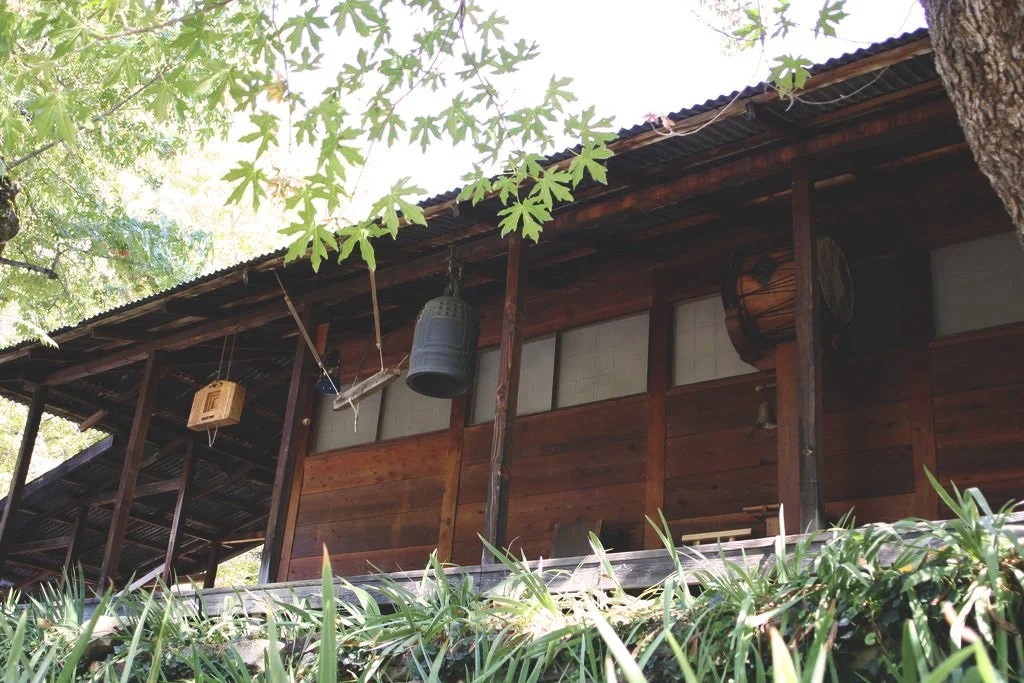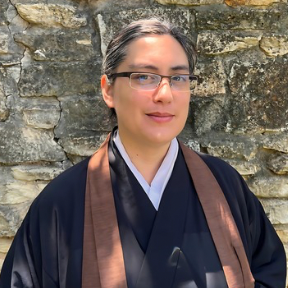"The sutras are spoken by the entire universe. The chirping of birds, the rustling of leaves, the sound of the rain—all these are the teachings of the Buddhas." – Dogen Zenji
Just beyond Tassajara’s gate, another luminous temple vibrates with aliveness, calls out for our veneration and presence, and overflows with timeless wisdom: the Ventana wilderness. Suzuki Roshi, founder of Tassajara, regarded this landscape as a potent habitat for awakening and the beings within it as fellow practitioners: “although we practice with people, our goal is to practice with mountains and rivers, with trees and stones, with everything in the world”.
Yet so often, a modern worldview—shaped by notions of hierarchy, human exceptionalism, mechanistic materialism, and isolation—prevents us from deeply and meaningfully participating in the living world. These inherently destructive perspectives, at play for millennia and now exacerbated by high technology, have created a dominant culture that views the natural world at best as a place for recreation, and at worst as “a storehouse and a sewer”, in the words of Buddhist eco-philosopher Joanna Macy.
Buddhism offers another pathway for relating with the natural world: a recognition that "Buddha-nature pervades all beings like the all-encompassing sky" (Mahāparinirvāṇa Sūtra). From this vantage springs an understanding of not only our fundamental fellowship with all that is, but also an acknowledgement that everyone and everything is potentially our great teacher… a Buddha. Furthermore, countless lay-practitioners, monks, and sages who have peered through the veil of delusion have arrived at the conclusion that no being is separate from another, and that interbeing—the web of deep relationship—is the truest expression of reality. As Thích Nhất Hạnh teaches, “We are here to awaken from our illusion of separateness.” These insights resonate with indigenous traditions across the world, and are more-than-likely in accord with the premodern, land-connected life-ways of all of our ancestors, regardless of lineage.
At this trying moment in history—facing climate breakdown, profound isolation, and deepening intolerance—it is a radical and revolutionary act to regard the wild and its non-human inhabitants as wise, sentient relatives imbued with rights and agency. This recognition is not only an ecological imperative, but also a reclamation of our own fundamental wholeness and belonging in this world.
In this retreat, we will embrace gestures of reciprocity and kinship with the wild. We will form a Sangha of mutual support with the land, our wild relatives, and one another, cultivating relationships for our collective ecological and personal well-being. Through contemplative hiking on rugged and diverse wilderness trails, we will attune ourselves to the living presence of our more-than-human kin—plants, animals, boulders, waters, winds. We will engage in Buddhist and non-Buddhist practices to cultivate awareness of the world as it actually is: alive, aware, and interconnected. And we will encounter ourselves as members of a vast, sacred family of beings, communing in the temple of the wild that has awaited our return.
Registration
This program is currently full.
Important details about this retreat
This retreat will include two full-day hiking excursions into the Tassajara wilderness, and one half-day hike, as well as Zen practice and Dharma discussion on the Tassajara grounds. Previous experience with Zen and/or hiking is not required. However, please be aware that we will hike on rugged and moderate to strenuous wilderness trails, often featuring very steep and uneven terrain, overgrown brush, prolonged sun exposure, crossing of logs and/or bridges, and wading through shallow water. Participants must be able to carry what they need for the day: 2-liters of water, pack lunch, and sun protection. Hikes will range from 3-7 miles with elevation gains and losses up to ~1,500’. If you have any questions about your ability to participate, please read our retreat FAQs, or email us.
Tassajara’s founder Suzuki Roshi lecturing in the original Zendo (c. 1968)
About Tassajara Zen Mountain Center
Fifty years ago, Zen first took root in California in an enchanting monastery deep in the Big Sur backcountry – the Tassajara Zen Mountain Center.
Founded in 1967 by the luminous Japanese Zen teacher Suzuki Roshi as an extension of the San Francisco Zen Center, Tassajara was the first Zen Buddhist monastery and among the first Buddhist monastic communities established in the western world.
Established on traditional, unceded lands and waters sacred to the indigenous Esselen people, Tassajara has been a sanctuary for generations of monks, and many centuries of people seeking healing and wisdom. For more about the relationship between Tassajara and the Esselen Tribe, go here.
In the spring and summer months, Tassajara opens its gates for guest retreats. With its serene accommodations, nourishing hot springs, sumptuous vegetarian meals, expansive wilderness, and Zen practice in the traditional meditation hall, Tassajara encourages a more spacious and present way of being in the living world.
Meet your guides
Abbot Dōshin Mako Voelkel
Dōshin Mako Voelkel began formal practice at San Francisco Zen Center Beginner’s Mind Temple in 1997 and entered residency in 2001. In 2002, they left a philosophy teaching position at City College of San Francisco in order to enter monastic practice at Tassajara Zen Mountain Center. Mako received priest ordination from Ryushin Paul Haller in 2004 and was Shuso in 2009. After ten years at Tassajara serving in a variety of positions, including Fire Marshall, Work Leader, Tenzo, Ino, and Director, Mako departed for a year-long pilgrimage through Asia and Europe. In 2013, they moved to Austin Zen Center to become Tanto, and in 2017 became the Head Teacher there. Mako received Dharma transmission from Ryushin Paul Haller in 2018. In 2022, Mako accepted the invitation from the SFZC Board of Directors to become Abiding Abbot of San Francisco Zen Center Beginner’s Mind Temple. Mako formally ascended the mountain seat in March 2023 and is now the City Center Abiding Abbot.
Mako is a full member of the Soto Zen Buddhist Association (SZBA), the American Zen Teachers Association (AZTA), and the GenX Buddhist Teachers Sangha.
Fletcher Tucker
Wildtender Co-Founder Fletcher was raised by the foggy redwood ravines and fragrant chaparral bluffs of the Esselen tribal territory now known as Big Sur, California. Fletcher is a lifelong student of natural history, an ancestral skills practitioner, devotee of trail-craft and minimalist backpacking, an experienced teacher of adults and children, and a multidisciplinary artist.
Fletcher’s inner work includes ongoing exploration in Zen and Taoist practices/philosophy; over a decade of study in the Gestalt lineage of Esalen Institute co-founder Dick Price; and engagement with the Earth-reverent, spiritual practices of his own Celtic and Nordic ancestors.
Fletcher is a NOLS certified Wilderness First Responder.
Tassajara FAQ’s
Questions about your retreat at Tassajara? Please consult our Frequently Asked Questions page.
Schedule a Call With Us
Interested in this program but have a few questions? Please use the calendar below to schedule a complimentary 20 minute exploratory call with us. We look forward to hearing from you!




